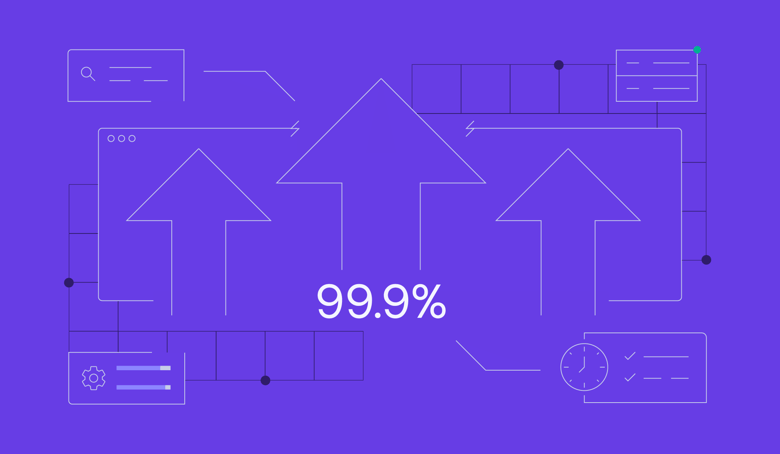Ensuring Your Online Success: Our 99.9% Uptime Formula

For your business, hobby, or blog to create value online, it must be accessible. That’s what our 99.9% uptime guarantee is all about.
What does this commitment mean, how do we ensure it, and what can you do to keep your website up and running? Let us tell you all about that.
Website Uptime Explained
The answer to the concept of uptime is encoded in the word itself: it’s the time when something has been “up”.
Usually, uptime is calculated in time units – days, hours, minutes, and even seconds. However, for the sake of clarity and simplicity, it is expressed as a percentage of availability per month.
Here’s how long your website may be unavailable in a month based on the uptime guarantee provided:

The differences are significant, so it’s important to pay attention to these figures when choosing a hosting provider. Hostinger is in the golden mean, guaranteeing the industry-standard 99.9% uptime.
It is worth noting that this does not mean the website will go down. On the contrary, we constantly strive for 100% uptime and usually deliver it.
However, unforeseen faults and outages might still happen. If the downtime persists, you can receive compensation, as outlined in our Hosting Agreement.
Why Is Uptime Important for Your Online Success
Uptime is a key factor in determining the user experience, your ranking in search results, and the overall success of your business or project online. Here are the main risks of downtime:
- Lost revenue. A non-functioning website can mean missed orders and, consequently, lost revenue and profits. Depending on the nature and scale of your business, this can translate into tens or even hundreds of dollars.
- Lower customer trust. Users lose trust and loyalty to a business that does not operate reliably. Moreover, they may share their bad experiences, which can result in lost credibility.
- Less organic traffic. Search engine robots constantly check the content of websites and, therefore, their availability. If a website is frequently inaccessible, the search engine may deem it unreliable and downgrade its ranking in search results.
- Wasted working hours. If the website is down, so is the business. Instead of doing your business tasks, you or your employees are forced to look for the causes of downtime that may take hours to fix.
Want to make sure your online business is always on track? Learn how to monitor your website availability.
The Four Pillars of Our Continuous Uptime
A number of factors can affect uptime, such as hardware malfunctions, software bugs, network and power outages, cyberattacks, and others.
We go above and beyond to prevent any of them from happening. Discover the four cornerstones that enable continuous uptime for your websites at Hostinger.
Powerful Infrastructure
By utilizing cutting-edge data centers positioned strategically across the globe, we guarantee a hosting environment that is both redundant and dependable. The latest hardware, a fiber-connected network, and a sturdy infrastructure work together to prevent downtime.
Key features contributing to performance and reliability and minimizing the risk of service interruption include:
- Highly resilient data centers with redundant power and cooling systems, multiple network connections, and robust security measures.
- Non-volatile memory express (NVMe) storage combines high performance and reliability.
- AMD EPYC processors ensure minimal latency and maximum stability.
- Double Data Rate 5 (DDR5) RAM technology reduces bottlenecks and potential downtime through higher data transfer rates and capacities.
- RAID data storage configurations safeguard against data loss from disk failures or system issues.
Proactive Monitoring and Maintenance
Latest monitoring systems and regular maintenance procedures create a hosting environment that prioritizes reliability and high uptime for your websites. Here’s how it works:
- Proactive monitoring tools detect and address potential issues before they impact your website performance.
- Round-the-clock surveillance of servers in multiple data centers ensures early detection of any anomalies or performance issues.
- Regular maintenance and software updates keep systems running smoothly and securely, minimizing the risk of downtime due to software vulnerabilities or system errors.
- Redundancy measures, such as backup servers and failover systems, minimize service interruptions in case of hardware failures or emergencies.
- Thorough testing and quality assurance contribute to the stability of server-side software and applications.
Advanced Security
Security flaws and vulnerabilities are yet another area that can compromise your websites and disrupt their smooth operation. Therefore, we apply robust security measures to mitigate the risk of cyberattacks, unauthorized access, and data breaches, ultimately enhancing the reliability and integrity of your online presence.
We can’t disclose everything for security reasons, but here are some of the safeguards we have in place:
- State-of-the-art firewall and DDoS protection mechanisms shield your website against malicious attacks and ensure uninterrupted service availability.
- Advanced security modules, such as mod_security and dedicated PHP hardening using various technologies, reinforce our hosting infrastructure.
- Your websites also benefit from comprehensive malware protection, guarding against malware outbreaks and ensuring the integrity of your data and online assets.
- Our dedicated security team oversees continuous vulnerability scanning and penetration testing to identify and address potential security risks proactively.
Optimized Web Performance
Many of the other technologies we use also contribute to the reliable operation and continued availability of your websites.
- Our Managed WordPress hosting leverages LiteSpeed – the fastest web server technology in the industry. When used together with LiteSpeed Cache for WordPress, it not only speeds up your website but also reduces the load on your server, which helps improve your website uptime.
- Our in-house content delivery network (CDN) running on global data centers further reduces server load and improves the reliability of your website by caching your site content in multiple servers and serving it from the nearest location to end-users.
- If you host a domain with us, count on Cloudflare DNS Firewall to provide enhanced security and reliability for your website. It protects your website from DDoS attacks, improves its speed, and ensures the integrity and authenticity of DNS responses.
What Can You Do to Have Better Uptime
Choosing a reliable hosting provider is the first and most important factor in determining uptime. Look for a track record of providing high uptime, redundant infrastructure, backup plans, failover procedures, and excellent customer support.
However, it’s not all up to the hosting provider; your website can become unavailable for other reasons, even if the servers and hosting services are working properly.
To ensure your website stays up and running smoothly, we recommend five proactive measures you can take.
Perform Regular Updates and Maintenance
Keep your website’s content management system (CMS), plugins, themes, and server software up to date to ensure optimal performance and security. Schedule routine maintenance tasks such as database optimization and file cleanup to prevent issues that could lead to downtime. Make use of a staging area and create an on-demand backup before making major changes to your site in case anything goes wrong.
Ensure Compatibility
Choose plugins and themes that are compatible with your CMS’s version and other essential tools. Opt for products that receive regular updates, as they often include bug fixes and security patches. Check user reviews and feedback for known issues before installing new plugins or themes.
Implement the Best Security Practices
Enhance your website’s security by utilizing the best web hosting security practices, including regular backups, SSL encryption, malware scans, and enforcing a strong password policy. Promptly address any identified threats to make sure that bad actors won’t exploit these loopholes.
Optimize Website Speed and Performance
Implement performance optimization techniques such as caching, minification of files, and object caching to reduce server load and improve website responsiveness. Incorporate a CDN to distribute website content across multiple servers located strategically worldwide.
Monitor Your Website
Regularly monitor your website’s performance metrics, including uptime, page load times, and server response times. Set up alerts to notify you of any anomalies or downtime incidents promptly, allowing for rapid response and resolution. Consider upgrading to a more powerful web, cloud, or virtual private server (VPS) hosting plan if your website has outgrown the current resources.

Conclusion
Ensuring uninterrupted online success requires attention to several critical factors. These include robust infrastructure with redundant systems, proactive monitoring and maintenance, advanced security measures, and optimized web performance.
Your own engagement is also important. By implementing strict security protocols, promptly addressing potential issues, and optimizing website speed, you can minimize downtime and enhance user experience.
By following these guidelines and partnering with a reputable hosting provider, you can be confident that you will achieve the full potential of your online business.



